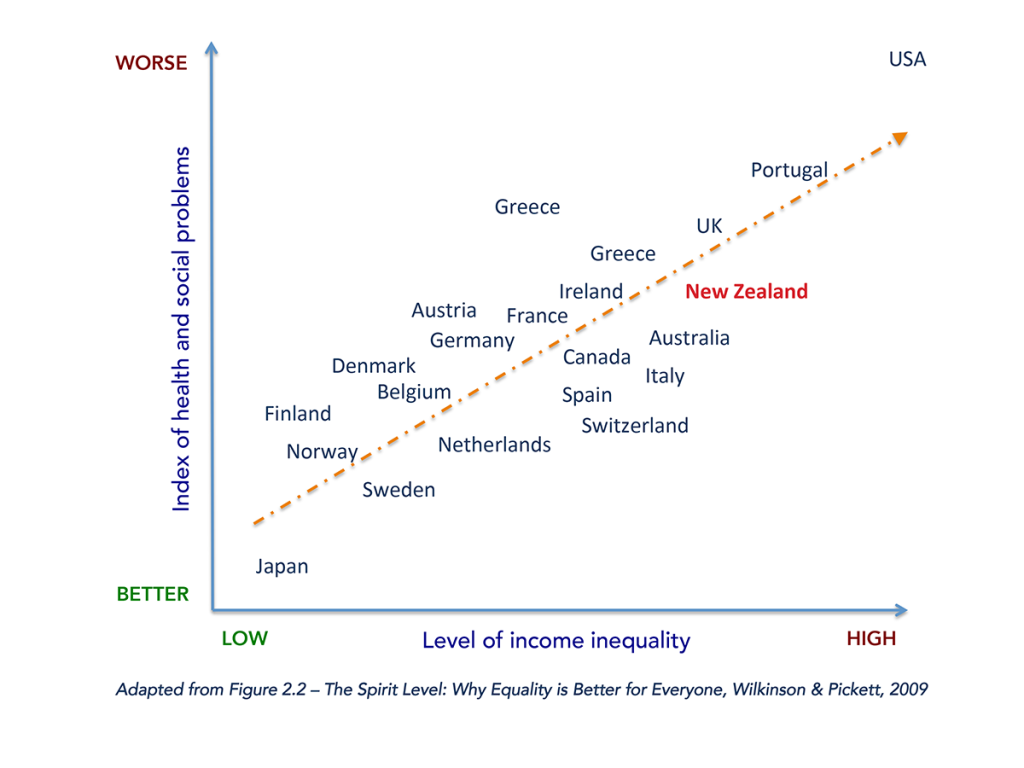‘Everyone who works has the right to just and favourable remuneration ensuring for himself and his family an existence worthy of human dignity’
– United Nations Declaration of Human Rights (Article 23)
At a time when New Zealand is experiencing one of the highest levels of income inequality growth amongst OECD countries, the Government, in a decision called ‘mean-spirited’ by the CTU’s Helen Kelly, decided to increase the minimum wage of $14.25 per hour by only 50 cents – still $4.50 per hour below the recommended living wage of $19.25 an hour, which wage campaigners say is the minimum necessary for a mother, father and two children to “live with dignity in New Zealand.”
The Minister of Workplace Relations and Safety, Michael Woodhouse, claimed the increase would benefit 115,000 workers, about one third of the 300,000 workers who live on or near the minimum wage according to Helen Kelly, and substantially less than the “one-third of all Kiwi workers who still earn below $19.25 per hour” according to the Rev. Charles Waldegrave (Family Research Centre).
And, as expected, Woodhouse defended his 50-cent increase by claiming “a higher increase to even $15.50 would constrain employment growth by up to 5,000 jobs per year”.Or, in other words, 5,000 jobs that would have existed, except for a further increase in the minimum wage will not exist, which is simply another (politically-expedient) way of saying that further increases in the minimum wage will result in job losses.
But is it true? Do increases in the minimum wage really cause unemployment?
Not according to Dave Oliver who writes in the Guardian that…
“Increases to the minimum wage do one thing: make life better for the low paid. They don’t cause unemployment, no matter what big business says…
…it’s possible for minimum wages to secure a fair wage for the low-paid without harming employment…and evidence from overseas supports this view…”
“A famous 1990 study, by David Card and Alan Krueger, compared fast food employment in New Jersey and Pennsylvania after one state increased its minimum wage and the other didn’t. They didn’t find a significant effect on employment. Another landmark paper looked at US restaurant employment in 288 different pairs of adjacent counties that had different minimum wages. They found that minimum wages are effective in boosting pay, but they don’t harm employment.”
“Similarly, in the UK, the evidence has been clear…The UK’s minimum wage is now 75% higher than it was when it was introduced, while the UK CPI has risen by just 37% over the same period…This large rise in the real value of the UK minimum wage hasn’t cost jobs.
The UK Low Pay Commission has now commissioned over 130 pieces of research from accomplished academic economists, which finds minimum wages boost workers’ pay, but don’t harm employment.”
And not according to The Employment Law Project, a New York based group committed to rebuilding the wage floor for low paid US workers, who comment that…
“…the most rigorous research shows little evidence of job reductions from a higher minimum wage.
Indicative is a 2013 survey by the University of Chicago’s Booth School of Business in which leading economists agreed by a nearly 4 to 1 margin that the benefits of raising and indexing the minimum wage outweigh the costs”
The article quotes eleven of the most widely-cited and influential studies on the impact of minimum wage on employment (including those quoted by Dave Oliver above) to show that there is no sound evidence to support the notion that increases in the minimum wage result in increased levels of unemployment.
And not according to Ross Gittens, who writes in the Sydney Morning Herald that
“Minimum wage rises don’t lift unemployment, analysts agree”
But a recent commentary published by the Australian Broadcasting Commission’s FACTCheck is a little more cautious…
“While the evidence does show that the overall unemployment level is often unaffected by changes to the minimum wage, people employed in low-skill and low-paying positions [may] experience greater adverse effects”
And so, in the face of substantive evidence to the contrary, it is difficult to accept at face value the Woodhouse claim that increasing the minimum wage from $14.50 to $15.50, or by $40 for a 40-hour week, would result in the loss of 5,000 jobs. And one wonders what the real effect on jobs would be if the Government progressively increased the minimum wage to match the living wage over say five years – a shift of only $1- $2 per annum.
But, Helen Kelly is right. It is the mean-spirited nature of this decision that we should focus on. Why, in a country with an alarming level of income disparity and unacceptable levels of child poverty, which we know is predominantly income related, would our government not choose to bridge the $4.50 gap between the minimum and living wage?
What’s your answer Mr Woodhouse?
For more challenging questions for our government, please refer to my earlier post ‘Is this my community?’

